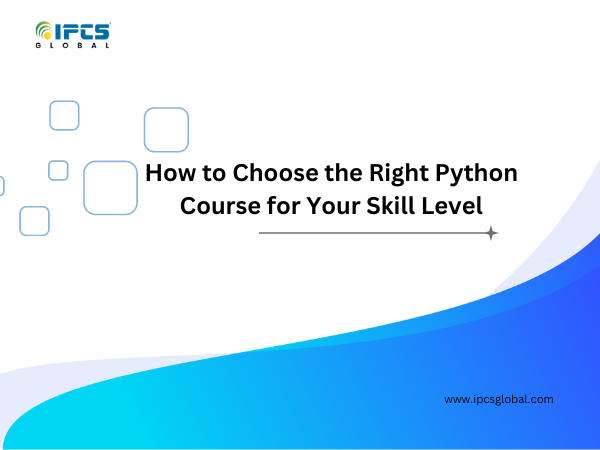Python has rapidly become one of the most popular and versatile programming languages, thanks to its readability, simplicity, and extensive applications in fields such as web development, data science, automation, and more. With the abundance of Python courses available, selecting the right one can be overwhelming. Whether you’re just starting or looking to deepen your expertise, here’s a comprehensive guide to help you choose the best Python training for your skill level and goals.
1. Assess Your Current Skill Level
Before diving into the vast array of Python training options, it’s essential to assess your current skill level. This will guide you in choosing a course that aligns with your existing knowledge and learning objectives.
- Beginner: If you’re new to programming or Python, look for a course designed specifically for beginners. A Python programming course for beginners typically covers fundamental concepts such as basic syntax, data types, control flow, and simple algorithms. This foundational knowledge is crucial for building a solid base.
- Intermediate: If you already have a basic understanding of Python, you might want to focus on more advanced topics. An intermediate Python training course will delve into topics such as object-oriented programming, advanced data structures, and libraries. These courses often include practical projects that help you apply your skills in real-world scenarios.
- Advanced: For those who are proficient in Python and wish to specialize in a particular area, such as data science or web development, advanced courses are essential. Look for a best Python course that offers specialized training, like a Python data science course, to enhance your skills in data manipulation, machine learning, and data visualization.
2. Define Your Learning Goals
Your learning goals will significantly impact the type of Python course that’s best for you. Identifying what you want to achieve with Python will help you choose a course that aligns with your objectives.
- General Programming: If you aim to gain a broad understanding of Python for general programming purposes, the best online Python course for you will cover a wide range of topics, including algorithms, data structures, and software design principles.
- Data Science: If your goal is to work in data science, you should opt for a Python data science course. These courses typically focus on libraries such as Pandas, NumPy, and Matplotlib, and may also include training on machine learning techniques and data analysis.
- Web Development: For those interested in web development, look for a Python training course that covers web frameworks like Django or Flask. These courses will teach you how to build and deploy web applications using Python.
3. Evaluate Course Content and Structure
Examine the course content to ensure it meets your learning needs. A comprehensive Python course should include:
- Fundamentals: A solid introduction to Python, covering basics like syntax, data types, and control structures.
- Advanced Topics: For more experienced learners, the course should include advanced concepts like object-oriented programming, file handling, and error management.
- Practical Applications: Look for courses that offer practical projects or real-world applications. Hands-on experience is crucial for solidifying your understanding and building a portfolio.
4. Consider the Learning Format
The format of the Python course can greatly affect your learning experience:
- Self-Paced Courses: These courses allow you to learn at your own pace and are often ideal if you have a busy schedule. Many Python training online programs offer this flexibility, allowing you to complete the course on your terms.
- Instructor-Led Courses: If you prefer structured learning and direct feedback, consider Python training courses that offer live instruction. These courses provide a more guided learning experience with opportunities for real-time interaction.
- Interactive Platforms: Some of the best places to learn Python offer interactive platforms where you can practice coding exercises directly in your browser. This format is beneficial for learning through hands-on experience.
5. Research Course Providers and Reviews
Investigate the reputation of the course provider. Look for courses with high ratings and positive reviews from past students.
- Best Python Training: Opt for courses from well-regarded institutions or platforms with strong endorsements from industry experts.
- Best Online Python Course: Online platforms like Coursera, edX, and Udacity offer courses from reputable institutions and often feature expert instructors.
6. Evaluate Course Costs and Certification
Consider your budget and whether the course provides value for money. Many Python training courses are available for free, but paid courses often offer additional benefits such as certification, personalized feedback, and more comprehensive content.
- Free Training Courses: These are a good starting point for beginners. However, ensure they cover all necessary topics and offer practical exercises.
- Paid Courses: Paid courses often include certification upon completion, which can be valuable for career advancement. Evaluate if the certification aligns with your career goals.
7. Look for Practical Experience Opportunities
Practical experience is crucial for mastering Python. Choose courses that provide:
- Projects and Assignments: Courses that include hands-on projects help you apply theoretical knowledge and build a practical portfolio.
- Internships or Capstone Projects: Some courses offer opportunities for real-world experience, such as internships or capstone projects, which can be highly beneficial for career development.
Choosing the right Python course requires careful consideration of your skill level, learning goals, and the course content and format. Whether you are looking for the best Python course for beginners, an advanced Python data science course, or the best online Python course for a flexible learning experience, there are numerous options available to meet your needs. By selecting a course that aligns with your objectives and provides practical experience, you can effectively enhance your Python skills and advance your career.
Explore various options, read reviews, and compare courses to find the one that best fits your requirements. With the right course, you’ll be well on your way to mastering Python and achieving your programming goals. Happy learning!



0 Comments